#The Dowsers Society
Text
Já está disponível o alinhamento do XVII Festival de Música Moderna de Corroios
O Festival de Música Moderna de Corroios já anunciou a programação das eliminatórias sendo que este ano cada eliminatória vai ter uma banda convidada, tal como a final.
Tomem nota:

View On WordPress
#Belavista 22#Cine Teatro do Ginásio Clube de Corroios#Contraluz#Cörte-Real#Democrash#Doutor Assério#Estrada de Santiago#Fardo Vadio#Fast Eddie Nelson#Festival de Música Moderna de Corroios#Guilty&039;s#Mars County#Melodraw#Mind Mojo#Semagrama#Slimmy#Stereophobia#The Dowsers Society#Victor Torpedo & the pop kids#Wildchains
0 notes
Note
It would be awesome if you could recommend some solo ttrpgs! I've been getting into them a lot lately and want to know more of what's out there. Especially journalling ones, as I enjoy creative writing. So far I've looked into (and will probably buy soon) Firelights, Apawthecaria, and Fox Curio's Floating Bookshop.
Also, I love this blog a ton. Already there have been some awesome games I've learned about from you, including the one you're currently working on. Excited to give it a try sometime! Keep being amazing 💜.
Theme: Solo Journalling Games
Thank you so much for your kind words! I'm certainly excited to run Protect the Child for folks, play-testing it so far has been really fun!
As for your ask, solo games and journalling go hand in hand. These next few games are just a sampling of what I've added recently to my Solo Games folder on Itch.
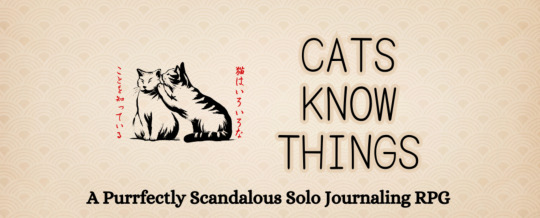

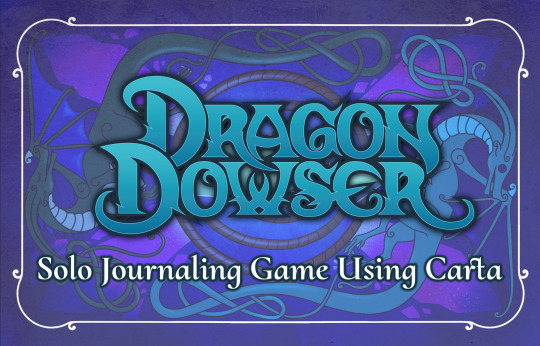


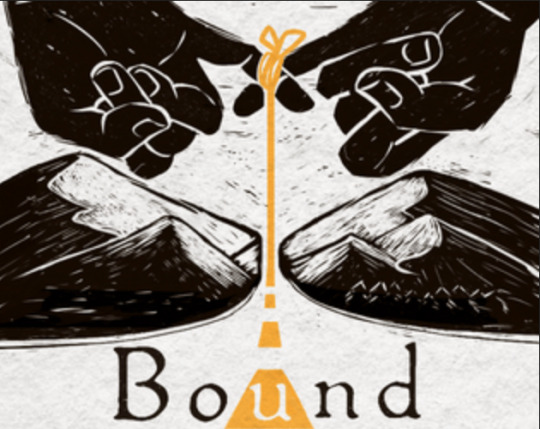

Cats Know Things, by Mushroom Witch Games.
CATS KNOW THINGS is a light-hearted game meant to tell a humorous story of intrigue, all while pretending to be a very nosy cat.
But you are no ordinary cat.
You are a very special feline who, through some magic you cannot explain, can communicate with your human, an individual who wishes to make their mark in society by any means necessary. The two of you decide to start a society page, (a very fancy type of tabloid newspaper dedicated to a particular location) revealing the glitz, glamour, and inner turmoil of the town’s most notable individuals.
Use a d6 and a d10 to generate numbers, and sneak into places to listen into secret or private conversations. Then bring this news to your human companion, so that they may relay this gossip in the local society page. You need to find 6-8 scintillating stories before the week is up, so that your human has enough to print.
If you want a game full of scandal and cute furry little rumour-mongers, this might be the game for you!
Lingering, by Meghan Cross.
The last thing you remember, you were dying.
Now, breath fills your lungs once more and your eyes open, slowly shifting side to side as you attempt to regain your bearings. You are alive. But you are…changed. Your human form is gone, and in its place is one that is different, foreign, animal…
In Lingering, you play as a person who has died, only to find yourself alive again in an animal form, unable to move on to your eternal rest until you settle business left unsettled from your life.
Throughout the course of a game, you will make several attempts to communicate with a chosen human, hoping to convey a message to them so they can assist you and help you move on once and for all.
This game uses a deck of cards and some guiding adjectives to determine how your attempts at communication will go. Over eight rounds, you’ll flip cards while guessing as to whether each card will be higher or lower than the previous one, and a successful guess means a successful interaction. The details of those attempts are what you’ll be journalling, and Lingering provides a number of questions that you might try to answer with each attempt.
This game takes place over eight rounds, so it’s excellent if you want a short, contained game. It also has a two-player option if you want to try this game out with a loved one.
Dragon Dowser, by HatchlingDM.
Dragon Dowser is a solo journaling RPG using the Carta SRD by Peach Garden Games. You play a mysterious character known as a 'Dowser'. Your aim is to locate abandoned dragon eggs and return them to your Sanctuary. If you succeed before expending your resources, the hatchling you rescue will be reared to change the kingdom forever!
This is a lovingly crafted game that uses card suits to represent four different kinds of ways your character will be tested, as they interact with different cultures, explore new landscapes, and dea with various conflicts, both human and nature-made.
You’ll travel across a grid of cards that provide you with journaling prompts as you travel. You’ll expend resources to overcome obstacles, looking for a dragon egg, represented by an Ace! Once you return this egg to a sanctuary, you’ll journal about your experience of raising the hatchling. Based on the games you’ve mentioned so far, I think Dragon Dowser is right up your alley.
EDEN, by blasez-faire.
You are Judaiah Clark, the Head Botanical Researcher at the Southern Sector of Eden. You are here for exactly 10 days, and were a last minute choice after the sudden disappearance of ■■■■■■ ■■■■■, the last person to hold this position. You are not here for work. Investigate.
EDEN is a single-page game that takes place over the course of 10 in-game days, with two questions that you will have to answer in your journal for every day. You are expected to write up a report with detailed notes, so much of the extrapolation taken from each pair of questions is going to come from your own imagination. To help with this you might want to come up with names for other characters, draw a map of the Southern Sector, or go into detail about the plants that this research station grows.
One thing is for sure - this is going to be a horror story. If you like games that give you a lot of room to stretch your creative wings, and you also like writing terrible endings for your characters, you might like this game.
Black Mountain Numbers Station, by Simon de Vet.
You wake one morning to the sound of a voice on the radio reading a series of numbers. On impulse, you jot them down. These numbers will become your life.
Black Mountain Numbers Station is a one-page, solo-journaling game about a mysterious broadcast, and about finding patterns in randomness. Using a unique dice mechanic to prompt you to describe your journey, you will tell a short story of obsession, frustration, and discovery.
This game is uses a 6x6 grid with boxes that you’ll need to fill when you roll a pair of dice. You’ll trigger evens when you roll doubles or find a certain pattern on the grid as you fill it, and in both of these cases, you’ll write special journal entries. The game ends when you fill your Frustration track, which symbolizes listening for too long without learning anything new. What exactly you learn, however, is up to you.
Bound, by K Ramstack.
Bound is a single player setting agnostic game about the connection between two people as they travel to a destination through the destruction of the world on a journey they will most likely not complete.
You will create two characters, their relationship to one another, the destruction that haunts them, and the motive for them to move forward.
During the game, you will be asked to write scenes in first person, switching perspectives between characters, and using their personality traits and subjective conceptualizations of each other to answer prompts.
Bound has a single and two-player version, and uses two decks of playing cards, one for each character. Each card will relate to a prompt on the prompt table, but only the highest ranked prompt will be answered. Each prompt will ask a question about the relationship, and how it changes.
If you want a deeply emotional game with a beautiful layout and lovely art, this is the game for you.
The Narrator Paradox, by psychound.
The Narrator Paradox is a one page solo-narrating game where you try to tell a story … if your protagonist will let you. In it, you determine the five acts of your story based on an oracle, then make rolls for your plot beats to see if you can wrangle your protagonist into the prescribed narrative. If you can't, they defy you and take the story into their own hands. Wrestle the story into shape against a rebellious hero, or lose them forever and have to finish the story without them in it.
Using the Major Arcana of a tarot deck, two six-sided dice and a coin, The Narrator Paradox has a number of different ways that you’ll try to keep your story on track. However, with so much randomness, your protagonist is sure to have a mind of their own. This feels very much in tune with how many writers talk about their characters as if those characters have their own desires, so if you’ve ever related to that you might enjoy this game.
Also Check Out...
My Solo Games tag! I use this tag for every recommendation post specifically for solo games.
138 notes
·
View notes
Text
Short Fiction, Fantasy: On Well-Wishers (BFS Horizons, 2019)
As promised, this is the first short piece I ever published. It's also the first story I wrote set in a wider fantasy world that I am still working on. In this earlier version, the world was a high fantasy rendering of our own world so there are some references to real places. It was published by the British Fantasy Society's Horizons magazine back in 2019 when I was working an utterly horrific job as a shift manager at a coffee shop, and its acceptance inspired me to jump into a PhD with both feet.
It's a short thing, a little fairy tale modelled after the best of them - full of hubris, darkness, and sharp teeth. I've resisted the urge to change anything. This is exactly as it was printed, but any flaws in its composition are mine and mine alone.
On Well-Wishers
Elias Croup had plenty of land, and everyone said so. From the watermill to the meadows that lapped against the dusty kingsroad. He had many workers and tenants. The gods had been good to him. The gods had been kind. And no one said a cross word about him.
To his face, at least.
Perhaps you saw him once or twice, cutting across the corners of his little empire. A shortish roundish man with a single curl of brown hair dangling from his head. It collected the perpetual sweat from his brow, and drifted from left to right in the breeze. He always scowled, as if the world told him nothing but lies. Elias smiled only the once - when his father died, and his inheritance cleared the small courts.
What the gods give to one man, they take from another. The water mill had belonged to a kindly old man, stooped and half blind, supported by his three daughters. Then the old man fell in the wheel of his mill. His daughters brought men from the village to tug and prise his mangled limbs from the mill’s workings.
Elias arrived the next morning. Condolences on his lips, his stubby fingers caressing the timber of the door frame, measuring the mill’s worth in the grain of its wood. The daughters wanted rid of the mill. Too many horrors. Elias bought it for a song, and reaped a symphony come harvest.
The fields and the meadows likewise tumbled into his hands. Petty swindles and a dozen accidents. Elias sowed his inheritance and fostered a small fortune.
But there was always more.
Everyone knew the most fertile land lay beyond the wood, but no one claimed it. The land and the trees around it belong to the fairies, and all feared their wicked tricks. Some left gifts of milk, bread, and honey at the wood’s edge in exchange for mercy and a bountiful harvest.
Elias did not trust fairy promises. He did not trust them because he did not believe in them. For that reason he came to the land beyond the woods and staked his claim. At the centre of the knoll lay a fairy ring. An oak tree, vast and vibrant, braceleted by pebbles and toadstools.
Elias tore them out. He brought men with axes and saws to labour in the hot June sun, and they brought the oak down. His workers set about preparing the land, clearing stones, and tearing up the earth ready for seeding.
He brought a famous dowser to his new land, and paid him handsomely. The dowser sprang, ran, veered and tumbled about the knoll. His magic twig humming and bouncing in his outstretched hands.
“Here my lord!” the dowser cried, at last, pointing to the spot where the great oak had been.
Elias set his men to digging the well. He sent for stones from the coasts of France. They shone pale and perfect in the light of the day. When they broke the ground at the foot of the well, it flooded and claimed the life of a local boy. A simpleton, by all accounts, who Elias paid with twigs and berries. Elias had insisted he be sent in alone for the crucial final stages of digging, as the boy had no parents and lived with a decrepit aunt who would not miss him.
When the water burst from the ground beneath the boy’s shovel, it swallowed him entirely. The other workers could only watch the serene surface of the water and pray he lived. Elias insisted that they wait until the water level rose high enough that the body could be retrieved with ease.
The thought of paying for the burial of any of the men around him brought a fresh sheen of sweat to his brow.
Once they fished the simple boy from the water, they left, happy with the day’s work though some took to muttering darkly about their employer and wishing a slow and horrible end for the landlord.
Elias returned the following morning and found the well dry. He scowled into the dark depths. But then, he always scowled. He summoned the dowser to demand an explanation.
The dowser produced his twig, and turned quite pale.
“My lord, I- I don’t know what to say. The water is gone” he said.
“Gone,” Elias said.
“Perhaps the sun dried the well,” the dowser said, “It has been rather hot.”
“Bring the water to this well. I have built this well, I spent a lot of money on this well, as I am spending a lot on you. Bring the water here.”
“I only find the water my lord. Perhaps an enchanter from the Royal Society-”
“-would demand the entrails of a goat, and a newly born babe glazed in honey. As well as a king’s ransom. Fill my well with water, or I’ll fill it with you and your family.”
The dowser nodded. Or perhaps he trembled. He pranced, he danced, rolled, cavorted, spun, and everything else once again. But he found nothing. The water had vanished.
Elias cut off the man’s left hand and threw him in the road, deciding a dry well was bad, a dry well full of decomposing dowser was beyond bearing. The dowser lay sobbing in the dust strewn road, cradling the pumping bloody stump of his wrist to his chest. Elias stooped to wipe the blood from his knife on the grass, and tossed the dismembered hand into the undergrowth with a snort of disgust.
Eventually a passing traveller brought his cart to a halt and carried the dowser to a healer in the next town. Others had passed before, but upon spying the landlord pacing and and growling by his well they hurried on and left the wounded man to his misery.
Day after day Elias came to his well to mumble and curse about his plight. In the village they spoke of the revenge of fairies. They wondered if this would be the downfall of
Elias Croup.
They were half right.
One day Elias came to the well and found a man standing there. He wore an emerald cloak. In fact, there was little of the man that wasn’t one shade of green or another, save his salt and pepper curling hair, and his pale skin.
“What are you doing to my well?” Elias said.
“Admiring it. Handsome work, if a little dry as far as wells go.”
“Yes, well, that isn’t by design. Now be off with you. I need to think.”
The green man turned to regard Elias. He scratched a tuft of hair below his lower lip
with his little finger.
“Perhaps I can help,” the man said, “I’ve stumbled across a few thoughts in my time.”
“I don’t see how. I have wasted a small fortune on this well. This land was to be given over to farming, but with the groundwater gone, it seems I misjudged the opportunity before me.”
“Perhaps,” the man said, running the tip of a finger along the stonework, “But isn’t it worse to misjudge a second opportunity, so soon?”
“What opportunity?” Elias said.
“Well, forgive me for my ignorance, but I was led to believe this is fairy land. Not that I believe such things.”
Elias snorted.
“Too right,” Elias said.
“But others are much more gullible than you and I. They believe all sorts of tales and fancies. When the village folk heard your well had run dry, they chuckled and shook their heads, talking of how the fairies tricked you. How they punished you.”
“Bastards,” Elias spat, “Ungrateful bastards. I provide the food on their table, the roof over their heads, and the straw in their beds. Bastards.”
The green man nodded and smiled.
“They make mockery of you. But you can turn the tables. Go into the village, and tell them of the wonders of your well. How it grants wishes, thanks to fairy enchantment.”
“I don’t care about revenge,” Elias said, “Although it might be good to see them humiliated. I’m more concerned about the wasted investment.”
“Fairies do not work their wonders for nothing,” the green man smiled, “They require payment. They must throw coin into the well, if they hope to be heard. Then we shall return and collect the coin the peasants so willfully wasted on a dry hole in the ground.”
The idea appealed to Elias. Revenge and reward in equal measure. He agreed.
The green man insisted on a deranged and maddened aspect, to better convince the village folk a staunch skeptic had been converted.
Elias rubbed the single coil of hair on his head until it bushed and fuzzed like desert grass. He rubbed handfuls of dirt into his cloak. The green man assured him he looked every bit the madman.
So it was that Elias ran gibbering to the folk of the village. He spoke of strange lights and curious enchantments. One of his cows had miscarried. His mistress sprouted a beard overnight. He told them he offered gold for mercy, and the fairies accepted on the condition he open his land so others could make gifts and receive the fairies’ boon.
The people flocked to the well, still chuckling about Elias’ misfortune. The landlord tried his best to appear cowed and contrite, but in his dark and devious mind he counted copper and iron coins until he lost track.
There was no sight of the green man until nightfall, when the last of the village folk had left in search of home, to dream of riches and wishes soon to be granted.
Elias laughed and clapped at the sight of him.
“My friend, it worked,” Elias said, “They came as you said. In their dozens to throw their meagre wealth into my well.”
“Did you not trust me?” the green man said, a glint of emerald in his eye.
Elias waved his hands.
“It doesn’t matter,” he said, “It worked. By all the gods it worked! Now, tell me, how do we get the money out?”
The green man produced a bucket and a rope.
Elias quirked an eyebrow and shook his head.
“I must say, my friend, I had expected something more inventive. We will be here through the night if we’re to try and scrape it all up in your bucket,” Elias said.
“Oh, no. You’re going to climb in. I’ll lower you down, and you can gather the money by hand.”
Elias laughed.
“I will never fit in that,” he said, gripping and shaking his rotund belly.
“Will you doubt me again, when fortune lies within easy reach?”
Elias scowled at the green man, and then at the bucket. He decided there was no point arguing. The bucket could barely fit one of his feet, and once the green man realised his foolishness, they could decide on a proper plan.
But when he slid his foot into the bucket, it fit comfortably. In fact, he was sure there was enough room for his other foot. Why- he could probably sit in the bucket.
He did so, and had a brief moment of discomfort. While the bucket could fit him, it didn’t seem to grow, nor did he shrink. When the green man lifted the bucket, he did so with ease. Elias cried out. He flapped his arms and squirmed and otherwise set the bucket to bucking and rocking in the green man’s grip.
“Easy,” the green man said, “Or I’ll drop you.”
“Drop me?” Elias shrieked, “Drop me? How is there even a me in this bucket to drop?
Set me down at once. Set me down and explain yourself.”
“Calm yourself. Deep breath, like this,” the green man sucked in a lungful of air through his nose and blew it slowly through pursed lips. Elias, caught up in the strangeness of the scene, could do little else but do as he was told, “You sit in the bucket because you deserve to sit in it. You see? This fortuitous turn of events, along with the riches awaiting you below, are nothing more than the world’s way of paying you your due.”
“That may be but-” Elias began, then he blinked. Once. Twice. He looked down at himself in the bucket. At his knees drawn up to his chest. He slapped his hands against the sides and roared, “I am not going to discuss this with you while I am sat in a bucket! Set me down now!”
“Calm, calm,” the green man said. Despite the force of Elias’ protestations, he never once lost his grip on the bucket nor seemed the slightest bit perturbed, “Look - does the bucket feel sturdy?”
“Well, yes but-”
“So you are confident it would hold you all the way down?”
Elias met the other man’s gaze for a moment, then said, “I suppose so, yes.”
“And here’s the vital question - have I not been the very spirit of trustworthiness?
Have I not delivered on all of my promises?”
“So far, yes.”
“Then I promise the bucket will not break. It will bear you to the bottom.”
Elias considered for a moment. His fingers drummed the rhythm of his thoughts and calculations against the rough wooden walls of the bucket. Eventually, he decided that he and the green man were the only two in the field, that there was a considerable amount of money at the bottom of his well, and that he could always have the curious fellow killed afterwards.
Elias agreed to remain in the bucket.
The green man lowered him into the mouth of the well, and fed the rope hand over hand. The bucket began its steady and smooth descent. Elias touched the dry stone of the well. How expensive it had been. But this new venture would see him well compensated.
Perhaps he could build another well. Perhaps he could build three.
He looked up into the shrinking mouth of the well. At the glittering stars above. He saw the green man smile, and point to the depths beneath him.
Elias looked over the edge of the bucket, and his eyes widened at the sight of all those glittering coins. They shimmered and shone. In the light of the day he had deemed them copper and iron. Not much, but the cumulative wealth was enough to satisfy him. Now, in the well he saw gold. He saw rubies. Red and glowing by the light of the stars.
The light shifted, and the coins seemed to shift too. Their shapes contorted. Elias looked to the green man, smaller now with the distance. The green man winked, and pointed.
Elias turned, to stare at a hundred sharp and glittering golden teeth. A dozen rubies blazing with hateful and hungry fire.
The bucket stopped, hitched, then plummeted as the green man released the rope.
Elias plunged into the glittering, ravenous dark.
He screamed as he fell.
He screamed as the teeth tore into his flesh.
The green man reached into the well, and cupped his hands around the landlord’s screams. He turned, laughing, and threw them to the wind. The wind carried Elias’ screams through the woods, and carries them still.
The well is no longer there.
The ancient oak grew from its depths, and the stones cracked and tumbled. Moss reclaimed them.
This is how the fairies took back their land.
#fantasy writing#writeblr#writer stuff#writers on tumblr#writerscommunity#writing#short fiction#short story#fiction writing#short stories#tumblr writers#fairy story#indie author#fantasy#high fantasy#fantasy short story#fantasy fiction#original fiction#original fantasy
13 notes
·
View notes
Text
AC 00103 - Appalachian Folk Magic & Traditional Remedies
Join Michael and Charlie for a discussion of everything from dowsing for water to plugging a tree as they dive into Appalachian folk magic and traditional remedies!
Don't forget to pick up Arcane Carolinas: Volume 1, out now!
Upcoming Live Appearances:
Ret-Con 2024 (March 1-3, 2024 - Cary, NC)
Links:
The Lumberton Report (arcanecarolinas.com)
American Society of Dowsers (dowsers.org)
Appalachian Dowsers (appalachiandowsers.org)
NorthCarolinaGhosts.com
Follow us!
Arcane Carolinas on Patreon
Arcane Carolinas on Facebook
Arcane Carolinas on Instagram
Arcane Carolinas on Tumblr
Contact us!
Listen now!
0 notes
Text
Final da Oeiras Band Session

Amanhã vai ser a disputada a final da Oeiras Band Sessions, a banda vencedora vai tocar nas Festas de Oeiras 2 dias depois.
Vai atuar no NOS Alive, tal como os The Dowsers Society, que foi venceu a edição de 2017, sobre as bandas deste ano não tenho nenhuma informação das mesmas, o que poderei descobrir se conseguir investigar.
Vamos recordar tudo com uma música dos Adolf Natur, The Eternal Return, um excelente fim de semana.
youtube
1 note
·
View note
Text
My 23 books I want to read for 2023:
1-5. Murderbot Diaries by Martha Wells
6. Carpe Jugulum by Terry Pratchett
7. Injustices by Ian Millhiser
8. Ella Minnow Pea by Mark Dunn
9. See What You Made Me Do by Jess Hill
10-12. Dowser #7-9 by Meghan Ciana Dodge
13. The Hate U Give by Angie Thomas
14. Babel, or the necessity of violence by R.F. Kuang
15. Dictionary of Lost Words by Pip Williams
16. The Tenth Kingdom by Kathryn Wesley
17. Race After Technology by Arusha Benjamin
18. The Cruelty is the point by Adam Serwer
19. American Pain by John Trmple
20. The Very Secret Society of Irregular Witches by Sangu Mandanna
21. Rebecca by Daphne du Maurier
22. The God of Lost Words by A.J. Hackwith
23. The Invisible Life of Addie LaRue by V.E. Schwab
0 notes
Text
The Lost and Found Child
The following remarkable story of five-year-old Haley and her incredibly helpful spirit friend was told to me at a book-signing event by the grandmother of the lost and found little girl. Grandma was the mother of one of my laser colleagues in Boulder, Colorado, where the event was held. The following is the story as she related it to me in 2008:
For years I had no reason to believe in a spirit world, but I had no reason not to, either. My granddaughter Haley had just turned six years old. She was a bright, only child with a reserved personality. [On Sunday, April 29, 2001] her grandfather and I thought she would enjoy a spring wildflower walk, and so we joined forces with three other adults for an outing. We decided to take a side trip to the Ozark Mountain Wilderness, one of our state’s most photogenic places, on the way to our wild flower walk.
Haley managed the easy downhill trail but resisted leaving because she wanted to go to a small waterfall partly down the cliff and high above the river below. In typical pouty child fashion she insisted on being carried back up the hill when we hurried her to stay on our schedule. Three of the adults went ahead while a friend stayed with me to move slowly forward at a pace Haley could easily overtake. A couple of glances back indicated she was coming our way; but, not wanting to start the pout again, we stayed out of her view. However, when I looked back a third time, she was not visible, nor did she come along after a short wait.
I decided she must have gone back to the falls, so I quickly returned, though I could not see her. A previously unnoticed side trail looked like a possible choice she might have taken, but soon I saw forking paths and dense foliage, which made it clear that she was dangerously separated from us. At this point the situation took on a life of its own.
Soon a massive search of the wilderness area began, including its many cliffs, tangled brush, and waterfalls. Eventually, it involved dogs, helicopters, and hundreds of people who were organized by the search-and-rescue officials in authority. Prayers were offered, and help of every conceivable nature was put into play. It was hard to believe that all this effort produced nothing, leaving us distraught and drained by the third day.
I went to a meeting of the American Society of Dowsers in nearby Fayetteville. There, one of America’s great dowsers, Harold McCoy, considered our desperate situation. He said that the little girl was “being taken care of by a kind woman” and that she would be “found by two men on horseback within the day.” [All these details were confirmed to me, Russell Targ, at a recent national dowsers’ conference, by Gladys McCoy, the wife of Harold. I am sorry to report that Harold McCoy died in 2010.]
In the afternoon of the third day, two local residents who knew the country well and owned mules had a hunch as to where Haley might have gone, and they decided to make their own search rather than be part of the large organized effort. After much effort, just as they were about to give up, they found her lying exhausted on a boulder at the edge of the river at the bottom of the cliff. After a very difficult trip out, they brought her to the hospital and safety.
As one might imagine, this story brought Haley and her family a great deal of attention, so they decided to take a little vacation to escape the glare of publicity. It was not until this time that Haley started talking about the friend she had made while lost. She said the little girl’s name was Elisha and that she was five years old. Elisha had come to Haley as soon as she was lost. Together they sang songs and played games, and Elisha acted as a guide to lead Haley down the bluff trail to the river through a very challenging ravine. The authorities had thought it was too difficult for a small child to manage this route wearing only a tee-shirt and flip-flops and so left it out of consideration.
While some children are known to have imaginary friends, this had never been the case with Haley. Nonetheless, Haley went on to describe her new playmate’s hair and clothing and drew pictures of her. I began to wonder if there had been an incident with a lost child in that remote area before and if there was a possibility of a spirit connection. After checking with authorities to learn about any legends or stories, I discovered that a child had been murdered and buried two decades earlier quite near to where Haley had been found. Fascinated by this information, I searched old newspapers and court records. [The grandmother was also a director of the local League of Women Voters.] Among these items in the possession of the authorities was a picture of the child’s mother, along with other photos of a religious cult. The cult members were accused and convicted of killing the child [whose name was Elisha] because the leader of the group, considered to be the “prophet,” had declared her possessed.
My search for the mother led me to the man who had served as the mother’s attorney. To my surprise, he had maintained contact with her, and he agreed to put us in touch with each other. The e-mails that followed were amazing to both of us. I learned that the month and very day that Haley was lost was the exact month and day that Elisha was buried. The name Haley gave for her friend was very close to a name Elisha had called herself. The hair and clothing styles Haley had drawn were distinctive of Elisha and the styles of the time at which Elisha had died. [Bell-bottoms and tie-died T-shirt.] Haley also told us about a silver flashlight that Elisha had at night and that Elisha had refused to let Haley hold it. I asked the mother if her daughter had had a flashlight, and she startled me with the following account:
Elisha had a Raggedy Ann doll that she always slept with. [A woman in the cult] took it away from her. I had a small silver flashlight that I kept in my room because Elisha was afraid of the dark. I had to work three jobs from early morning till late at night and I found out later that [the woman] would put Elisha in the room in the dark. After her doll was taken, Elisha began to sleep with the flashlight. I would wake up at night and find that she had it with her under the covers. She would cry when I would try to take it, and most of the time I let her have it.
After thinking about this possibility of a spirit child, I have wondered if Elisha was, in fact, the lure to attract Haley away from the adults and off the right path, rather than the means to save her. The canyon-trails part of this story has now been described in a privately published book, The Search for Haley: An Insider’s Account of the Largest Search Mission in Arkansas History, by photographer and trail guide Tim Ernst.
That’s the end of the Haley story, but it’s not the end of Harold McCoy’s exploits that year. In her recently published book Extraordinary Knowing, psychiatrist Elizabeth Lloyd Mayer tells the story of a lost-and-found harp that in its own way is as remarkable as the tale of Haley.
In December of 2001, Dr. Mayer’s eleven-year-old daughter Meg gave a harp concert at a hall in Oakland, California. In the course of festivities after this Christmas concert, someone stole her valuable, hand-carved harp from its resting place backstage. The daughter was heartbroken over her own carelessness as well as the loss of her precious instrument. Mayer writes, “For two months we went through every conceivable channel trying to locate the harp—instrument dealers, police, TV, Harp Society newsletters—nothing worked...
Finally a devoted friend suggested that I call a famous dowser—Harold McCoy, in Fayetteville, Arkansas,” which was a thousand miles away. Mayer called McCoy and told him her story. After a few moments of reflection he told her the harp was still in Oakland. He suggested that she send him a street map of Oakland, which is a large industrial city on the east side of San Francisco Bay. Two days later, McCoy called to say, “I’ve got the harp located. It’s in the second house on the right on D__ Street, just off L__ Avenue.”
Mayer found the house, but didn’t know how to proceed in this very run-down neighborhood. And the police wouldn’t help her to get a search warrant. After puzzling over what to do next, Mayer decided to post fliers within a two-block radius of the house. Two days later she got a call from a man who said that he had seen the flier and that his next-door neighbor had shown him the harp. After a series of circuitous phone calls the caller agreed to meet Mayer behind an all-night Safeway at 10:00 that evening. The harp was returned. And, as Mayer writes, “This changes everything.”
-- Russel Targ, The Reality of ESP
1 note
·
View note
Text
Thinking about the portrayal of the american dream in Minari and the way it complicates that portrayal specifically through an Asian American lens... We all know the american dream myth, pull yourself up by the bootstraps, in america you can accomplish anything as long as you work hard enough, and if you're asian american chances are you probably grew up with that myth conflicting with the collectivist ideals that are prominent in many asian cultures (valuing family/elders above all else, putting the good of the family/society over your own desires, etc.). And I think that's showcased really well in this movie! After all a primary conflict of the movie is bw family/stability (represented by monica) and pursuing the american dream (represented by jacob). But this movie is very careful in its deconstruction of the american dream - Jacob is so relentless in his pursuit of success by his own hard work that he ends up prioritizing his farm over his son, the boiling point of the entire movie. And yet we see so many times that his failure is rooted in his unwillingness to reach out for help - the well he dug himself ran dry, he makes mistakes at work bc he overworked himself, he almost loses his family at the end. And he keeps insisting he can do it all on his own - they don't need a babysitter, they don't need county water, they don't need to move back to the city. The moments that actually drive development - his acquiescence in bringing monica's mother to live with them, his acceptance of Paul as a helper, in the end when he chooses to save Monica over his crops, and then of course actually accepting the help of the water dowser at the end in a scene that implies they're staying in arkansas - are rooted in connections to other people, leaning on others for help, and especially one's love for one's family. In the moment of crisis Monica rushed in to help Jacob save his dream, but ultimately he realized his dream couldn't happen if they couldn't save each other.
#minari spoilers#if thats relevant idk#many thoughts!!!!!!!#minari#the writing in this movie... absolute chef's kiss#sarah.txt#story meta
22 notes
·
View notes
Photo


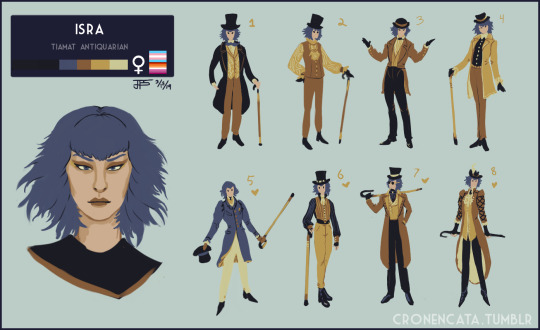
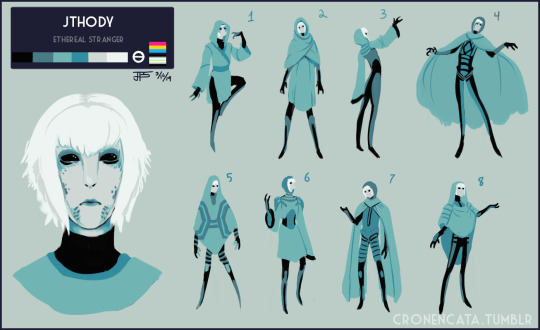
Another batch of band-based weirdos from two years ago! Just as before, a few of these characters have gone under revisions since I made these sheets.
The throughline of this batch is just ‘supporting characters,’ I guess- Two of them are arguably villainous, or at least I tried to write them as such in my story drafts, but that didn’t exactly work as intended.
Character info under the cut.
Mikita Zaysteva: Mikita is what is called a ‘Dowser’- a person intentionally infused with tiamat for the purpose of locating sources of tiamat, identifying infused, and pursuing infused criminals. He is a high-profile bounty hunter backed by the federal government, and has inherited the task of tracking down and capturing Reyes. He sees himself as a guardian of the people, an instrument of law-- but as he uncovers more about his current case, the cause he’s been serving comes further and further into question...
Mikita is a refugee from a war that destroyed his family’s home in the countryside. He was saved and briefly adopted by Werner Braxton, and has worked to emulate him ever since- unfortunately, he’s unaware that his childhood hero would balk at his choices.
I’m ... uncertain of whether or not Mikita is a cyborg. That was never something I specified with myself and was hesitant to address in-universe for fear of losing the tenuous ‘real world’ setting. Now that I’ve pretty much abandoned that angle, though... He’s probably a cyborg of some kind.
Werner Braxton: A veteran from a war fought a few decades ago, and one of the most infamous examples of tiamat infusion weaponized. Dubbed the Miasma during his service, Werner was infused with copious tiamat to cultivate a devastating power then utilized by the US army. Werner’s infusion allowed him to generate a cloud of acidic gas that ate away anything it touched. The destruction wrought on the country he’d been deployed in was immeasurable- and after the war was won, Werner looked upon all that he had done in horror. The last days of his service were performed with grit teeth. Unfortunately, his superiors had been so pleased with the results that they infused him with more and more tiamat- until his body began to consume itself, and his powers ceased.
Werner was given various conmendations in quiet, and then discharged with few means of support. His body requires various medical apparatuses to function. Werner had been told his country was in danger, and now he knows he’d been deceived. He’ll always leap to defend people who cannot defend themselves, but his opinion of the army and infusion has plummetted through the floor.
The experiments used to cultivate Werner’s power were the precursor to the Black Flock Project.
I like to think of 1-3 as Werner’s appearance during active duty. 5-6 are, as labelled, too badass for what I was going for, but might be fun for an alternate universe story. Design 8 is his canon one.
Isra: The one character I’ve designed such far for this universe that has not infused themselves with tiamat. Isra is a member of an antiquarian society and specializes in tiamat-related artefacts from across various eras and civilizations. She’s deeply enthusiastic about her research, and has been published in a few infused-run magazines, but she routinely displays the same hesitance to engage with the infused as any other non-infused. She’s attempted to interview Zan Wen, but ghosted him each time he could appear. She’s aware of the issue, and tries to work against it, but the repulsing aura of tiamat is hard to overcome.
Jthody: Who is this??
Jthody’s infusion allows them to morph things into idealized versions of their past. With enough power, Jthody can turn entire buildings back in time, complete with ghostly visages of prior occupants.
Jthody, out of this batch, has undergone the most changes. They’re also the only tiamat character to date that I’ve started a 3D model for. As you can see, their design has come a long way- mostly emphasizing a pearlescent quality. I thought it suited their vibe better than a more straightforward ‘alien’ one.
2 notes
·
View notes
Quote
The mystical technique of locating new groundwater sources is thought to have first come into vogue in Europe in the Middle Ages. The method is known as dowsing or divining, or even doodlebugging, and those who practice it are called water dowsers or water witches — a phrase that may have originated from the practice being deemed witchcraft in the 17th century.
The National Ground Water Association, a group of experts, including hydrogeologists, that promotes responsible water use, describes water witching as “totally without scientific merit.” Some California farmers who pay for the service, however, say it often provides a cheaper alternative to traditional methods, such as hiring a geologist or prospector.
The American Society of Dowsers says it has about 2,000 members, several of whom are working water witches. Other dowsers claim they can locate treasures, lost objects, alien life forms and stress in the body. Some dowsers dangle a Buddha pendant above a printed map or a laptop screen to find what they are looking for. Mr. Thompson — who also dowses oil, gas and minerals — says when he steps over groundwater, the energy surrounding him changes, causing an involuntary muscular twitch within him that makes his rods cross.
“People think you’re crazy,” said Larry Bird, 77, a Sacramento-based dowser who learned the method from his grandfather, a melon seller from Pawnee, Okla. He described the sensation of being close to water as being akin to a magnetic field. “It leaves me hot,” he said. “Just like if you short a battery.”
Sharry Hope, a longtime dowser based in Oroville, Calif., says standing over water leaves her with a “chilling sensation.” Ms. Hope claims she learned one of the techniques she uses to find water on maps from a former military officer: She swings a pendulum until it stops and points toward a “water vein,” Ms. Hope said. “I just mark it with a Sharpie.”
In California Drought, Water Witches are Swamped - The New York Times
1 note
·
View note
Text
Já foram reveladas as 12 bandas do XXVII Festival de Música Moderna de Corroios
Pode ler-se nas redes sociais do festival: “Após um árduo processo de audição dos 75 projetos concorrentes ao XXVII Festival de Música Moderna de Corroios’ 2023, com as dificuldades inerentes e que envolvem uma escolha difícil e subjetiva, agradecemos a todos os que nos enviaram os seus trabalhos e apresentamos, por ordem alfabética, os projetos selecionados e suplentes para este XXVII Festival…

View On WordPress
#Bela Vista 22#Contraluz#Doutor Assério#Fardo Vadio#Festival de Música Moderna de Corroios#Ginásio Clube de Corroios#Guilty&039;s#Mars County#Melodraw#Mind Mojo#Semagrama#Sterephobia#The Dowsers Society#Wildchains
0 notes
Text
Ozark Folk Healing

Folk healing and magic in the Ozark Mountains isn’t a well-defined set of practices. It encompasses countless traditions that were both brought to the New World by immigrant groups and were picked up through interactions with indigenous peoples. These traditions mixed and melded together in the melting pot of the Appalachian Mountains. Then, they were brought with hillfolk into the Ozarks during settlement of the region in the early 1800's after the forced removal of the Osage and Old Settler Cherokee. These Appalachian families found a familiar home in the hills and hollers of the Ozarks. The traditions of healing and magic they brought with them would continue to evolve and change through extreme isolation on the one hand and interactions with new cultural centers on the other. They are still evolving in this way today.
Some of the best resources we have for these Ozark folk traditions come from renowned folklorists like Vance Randolph, Mary Celestia Parler, and Otto Ernest Rayburn. Many no doubt have a copy of Randolph’s Ozark Magic and Folklore on their bookshelf right now. These folklorists spent much of their lives collecting and publishing material collected first-hand from Ozark hillfolk. These resources have become a vital link with our past in a rapidly changing region. Another significant amount of information has come from popular works like the “Bittersweet” and “Ozark Mountaineer” magazines, and even the well-known “Foxfire” books. This series, while not directly about the Ozarks, does cover folkways from the cultural homeland of the Ozark hillfolk in the Appalachian Mountains. This cache of collected material becomes integral to any studies on Ozark folk culture because for the most part, we're talking about the past.
A problem arises early on for anyone studying Ozark folkways; it's very much a culture that is disappearing. Some would say dying, but I choose to say changing or evolving. There are still rural areas holding pockets of some of the old folkways, but for the most part, as with many other American folk traditions, most of this knowledge which at one time would have been so vital to survival, is now limited to the weekend fall festival, square dance, or museum reenactment. It would be an overstatement to call these folkways a living tradition in the Ozarks. There are still those in the region who are working hard to preserve what little material is still out there and to educate folks about these folkways before they’re lost forever. I've been a part of this struggle for years now, collecting my own folk material and working methods of traditional healing into my own practice as a Power Doctor, or one who heals with plants and prayers. While it’s a sad sight seeing these traditions die off with every passing elder, we have to look at the Ozarks of today and what this new culture has to offer. Before we do that, let's go back in time and examine where we’ve come from.
When we talk about Ozark folk healing, we can divide practices and knowledge into two main groups. I’ve worked hard trying to come up with some cleaver names for these groups, as have other folklorists. Some might use nature-based and faith-based medicine. When you look at the details though, faith plays a vital role in all aspects of the work. I choose to use plant-based and non plant-based medicines. Cleaver, I know. The plant-based group includes, well, plants! Whereas the non plant-based group covers items repurposed from the cabin like string, knives, axes, bones, feathers, eggs, etc. These hold just as much healing power as a locally harvested yarb or healing plant. You’ll notice I haven’t divided between magic and medicine, as these labels are found across both groups. Red cedar (Juniperus virginiana), for instance, can be used in salves for healing the skin, or burned to drive away evil spirits.
The plant-based category includes traditions of folk herbalism held by the community Yarb Doctor or Granny Woman. Both of these terms, as well as others that will be mentioned later on, come from out of the old Ozarks, although they can still be heard in isolated cases today. These medicines incorporate ingredients from the botanical world and include remedies that many would be familiar with even today. Herbal preparations include salves, ointments, tonics, tinctures, powders, drops, draughts, and many more. Much of the herbal knowledge of the mountain Yarb Doctor comes from a blending of traditions from across Europe and the knowledge of native plants offered by the indigenous peoples, particularly of the Southeast. One can note many similarities in remedies between those collected by folklorists like Vance Randolph and those that appear in the Appalachian Foxfire series. In many cases we see the uses and beliefs surrounding plants native to Europe later applied to New World examples that bore some resemblance to the original plant. For instance, the associations of European Mandrake (genus Mandragora) applied to the Mayapple (Podophyllum peltatum), often called American Mandrake.

The non plant-based category includes the use of items of great healing value that were repurposed from household tools and paired with prayers, verbal charms, and ritual, in order to magically heal a patient. This would be the expertise area of the Power Doctor and the Goomer Doctor. The Power Doctor heals through the use of magical charms, prayers, and is an expert in ritual and the making of talismans. Occasionally they might have some herbal knowledge that they bring into their work, but most often, any use of plants is through their magical, not medical, properties. The category of Power Doctor stands on its own, but might also include such specialized healers as Blood Stoppers, Burn Doctors, Wart Charmers, and sometimes even the local preacher. The Goomer Doctor deals with all cases of goomering, meaning hexes, curses or any malign witchcraft that might be put onto someone. Also sometimes seen is the Witch Doctor, or Witch Master, also able to cleanse a person of any magical maladies. The Witch Doctor isn’t himself a witch, but someone skilled in removing the effects of witchcraft on a person. It should be noted that in most Ozark accounts, the word witch is seen in a negative light and refers to someone who uses their magical gift to harm or steal from others. The witch stands in direct opposition to the Doctor, whose gift is said to come directly from God or another divine source, and acts as a foil to the witch’s work. There are exceptions, as with the water witch, the witch wiggler, both names for traditional dowsers, able to find underground water sources through magical means, and the white witch, little used in the Ozarks, but often heard in the Appalachian Mountains. Healers are always cautious when using the word witch and often walk a very thin line between what is socially acceptable and what isn’t. Ozark people often tread in a gray area when it comes to magic and healing. A healer who prays, believes in God, and does good works in the community must then be considered good. A healer must constantly be vigilant about how they appear in the community, lest they be taken for a witch in disguise. While we Ozarkers don’t worry so much anymore about witches, it’s still a thin line that healers walk. Nowadays it’s a line between what is helpful and what those who don’t believe might label as quackery.
There have been and still are healers whose expertise covers both the plant-based and non plant-based medicines. The trend over the past fifty years or so has been that the magical and religious healing traditions are dying at a much quicker rate than the herbal knowledge. One reason for this is an increase in interest in herbal and alternative medicines since the 70's and 80's. The Ozarks have always been a hub of herbal activity, providing many useful plant medicines to pharmaceutical corporations as well as the local herbalist or naturopath. With this increased interest in herbal medicines the need for more and more scientific validation behind herbal preparations has forced the faith-based or magic-based healing traditions to retreat into the shadows. My experience has been that these practices no longer go hand-in-hand with herbal medicines as they once used to, and are more likely to be labeled as vestiges of a more superstitious past by researchers. One can understand why many modern Ozark people might want to disassociate themselves with anything related to these old traditions and so-called superstitions of their parents or grandparents. Someone who was passed a healing charm now finds themselves without any kin or interested listener to then pass it on to, and so the charm dies. By its very nature, many of these practices depend on having someone to pass the knowledge to, almost always orally, and most often with the understanding that the traditions will be used and not recorded in any way. There has always been a taboo against writing down or recording much of this traditional knowledge. In this way, many of the Ozark healing knowledge and practices are naturally susceptible to forgetful minds and the changing times.

As a modern Ozarker living in an ever-changing Ozarks, I find myself at the crossroads between the traditions of my past and those of my future. For many old timers, change is an unwelcome force to their day-to-day lives. “It was better in the good ol’ days!” they say, but for who? For minorities it wasn’t so great. For anyone who was different or stood on the fringes of society it was a terrible time. In the old Ozarks, the local witch was often this person. Sometimes a widow, or someone with a disability, or someone who just plain didn’t like people, could easily be pushed to the edge of town. This isolation from society was often the nail in the coffin for hillfolk, many who depended upon the amenities of life in town. Exile was the best option for a witch, though, as hillfolk were known for lynching witches, people of color, and those caught in the arms of the same sex well into the 20th century. This vehement hatred for change remains throughout the older generations, but we see today an evolution of what it means to be an Ozarker as more and more people from diverse backgrounds arrive in the area.
What are our Ozark traditions today? How can we keep the candle of the past burning while still embracing new folkways and identities? This process requires a good amount of pruning. There are folk traditions that should be studied but not practiced. For instance, the old Ozark remedy for the terrible skin condition called shingles once was to cut the throat of a black cat and rub the blood in a circle around the afflicted area. So, you know, that’s probably not something we should bring with us into the future. There are other traditions that need pruning, but at the core of Ozark folk culture is this connection to the land, the plants, hills, hollers, and rivers that make up the natural landscape for us, and what that connection means for us spiritually and magically. For the longest time city-folk, or those living in farming communities throughout the old Ozarks were rightfully afraid of the monsters that lurked up in the hills and the people that knew how to tame them. This fear didn’t go away, despite what people in town might say. There’s still a suspicion about the wildness of the Ozarks and what magic might lie hidden in the trees. For the healer this is the heart of the magical world, this is power. Herein lies our connection to what it means to be an Ozarker; a deep connection to the land that we can see and the land we must use other eyes to view. This connection crosses all cultural and personal boundaries. In this way, we as a younger generation can embrace the strength and wisdom of the past while understanding that all traditions must evolve.
#ozarks#folk magic#traditional witchcraft#witchcraft#folklore#ozark folk magic#ozark folk medicine#Ozark Folklore#ozark folkways#traditional medicine#traditional healing#herbalism#spiritual healing#ozark healing traditions
48 notes
·
View notes
Photo

@thewishaniggawoods
Aquarius sun, Taurus moon, Capricorn rising, Pisces mars, Pisces mercury, Scorpio Midheaven.
Life path no. 6
Proud and domineering, the Aquarius Sun Taurus Moon personality can be very soft on the inside and prefers to keep their life as private as possible.
You are a good combination of emotionality and intellectuality. You can’t function without a purpose and you are usually highly efficient at what you set your mind to. Rational and flexible, you make a great executive. All you need to do is to wish to be the managers. More interested in personal satisfaction rather than oriented to attract the attention of the public, you are never too domineering and never try to impose your will on others. You are more the type that goes with the flow. You are light-headed, composed and determined but can also be stubborn, conflictual and obsessive. Some people may think of you as snobs because you are so detached. But you aren’t. When you’re observing others, you don’t care about the financial aspect or the position in society.
Usually Aquarius — although materialists, but are impractical people. True, this does not apply to you. You care very much about the reliability of your position and are distinguished by some avarice. Nothing can undermine your health more than financial difficulties, and you stay up late at work, trying to manipulate your accounts and create a work plan that would ensure the greatest profit and help to fill your wallet. You immediately move from depression to ecstasy, from optimism to pessimism. The only consolation is that you definitely do not get bored with it. You have a tenacious memory, and although you can forgive the offense, you will never forget it. You are ambitious, but a career for you is nothing more than a spectacular performance that you play, if at the same time you are experiencing financial difficulties. Crisis situations only inspire you, and if you made a decision, they are able to achieve almost impossible. Once you recover from a negative reaction to the situation, you start from where you left off. You can be closed in the presence of strangers, but in the company of close friends you are eloquent and resolute. Money and property mean more to you than people, most of which, in your opinion, can always be bought. You are suspicious and confident that people in their actions are always guided by selfish motives. If you are right, this serves to justify your alienation from people and the instinct of acquisitiveness.
You are guided by the need for recognition, which could enhance your self-esteem. In most situations, you manifest yourself as a person organized and domineering, so you can get an excellent administrator. You also do a good job of working on finances, and you can become a successful collector. You are an ambitious but patient worker, ready to make a career step by step, not by taking off immediately, which is fraught with a deafening fall. You will achieve prosperity with the help of your talents, as well as with the support of friends and family. Since Mars Pisces is so open and often without boundaries, you instinctively protect yourself by staying in the background. This allows you to observe the full dimensions of what's happening, and act when the time is right. Not everyone will understand you and may judge you as passive, or a loser who doesn't jump on opportunities. But the secret gift here is your ability to give over to a bigger wave and ride it to an outcome that's sensed at the soul level. With Pisces mercury (high five!), you are always in your feelings. You're a gentle communicator with a soft touch that is pleasing and warm. You don’t compete for air time, but you can talk up a storm when you’re in the right frame of mind. Predicting when that will be can be difficult, though. It can be hard to pin you down to any one belief or decision. It’s not that you want to drive people crazy or anything–it’s just that you take in so much information from the world and your open-mindedness prevents you from taking a stance for too long.
Your destiny is not simple, to say the least, and very often marked with reversals of fortune. You transform other people and yourself alike! You are patient and clear-sighted, and you are on the lookout for the right time to unleash all your powers and your enormous might with a view to reaching the goal you set for yourself, and which you have every chance to achieve. You are not only persevering and resilient, but the worst tragedies and crises have a stimulating effect on you. Nothing can stop you as far as domination and business are concerned. Your urge to wield power continuously fuels your energy. Any occupation in the police and the military, miner, volcanologist, engineer, atomic scientist, scientific researcher, computer designer, surgeon, gynecologist, sexologist, psychiatrist, psychoanalyst, dowser, astrologer, occultist, medium, clairvoyant, mystic, corporate manager, banker, financial counselor specialised in stock exchanges or investments, funeral director, as well as politician leader will be a good fit. My advice to you will be that sometimes, actually more than just sometimes, its good to take care of yourself first and not just sacrificing your needs for others in a heartbeat. I know this is generic Aries advice but really! There is nothing wrong with putting on your seatbelt before you help others buckle up. All the best <3.
#aquarius#sunsign#taurus#moonsign#capricorn#risingsign#pisces#marssign#aesthetics#piscesmercury#moodboards#zodiac signs#astrology#lifepath no. 6#mercury signs#aesthetic#astrologyreport#just-astrology-stuff
10 notes
·
View notes
Text
Thinking about it, the majority of the media that I’m Extremely Passionate about are book series.... Bnha and Kiribaku are a bit of an anomaly for me!
On the one hand - I adore the series I love and will always love. On the other hand it gets frustrating sometimes ‘cause there are rarely like, big fandoms where I can find people to talk to about these books!
So yeah if you ever want to start a non-krbk conversation with me use any of these series and i will Talk:
His Dark Materials, Philip Pullman - as mentioned earlier it’s getting a TV adaptation rn and i’m super-stoked about it! Souls as animals, a wonderful pair of protagonists, alternate worlds, full of love and death and war and bittersweetness. The main characters, Lyra Belaqua and Will Parry, god I love them.
Chaos Walking, Patrick Ness - THIS IS MY #1 FAVOURITE THING EVER. it’s getting a movie soon and i’m ??? hopeful?? that it might be good?? It’s set in the unspecified future about a boy named Todd Hewitt on an alien planet where everyone can hear each other’s thoughts. It’s so GOOD. Themes again of war and death and love, of humanity at its best and its worst, of prejudice and hate and ideals and altruism. It’s about growing up and the price of innocence and the worth of fighting for what you believe in. Just. It’s good.
Chronicles of Ancient Darkness, Michelle Paver - set in Ancient Europe pre-agriculture, when the Great Spirit still walked the lands and magic was real. The main character is a boy from the Wolf Clan named Torak whose father is killed by a demon trapped in the body of a bear. He befriends a young wolf cub, and befriends Renn, a girl from the Raven Clan. As the books go on you learn more about the history of both of their parents and what their parts to play in the future of the Forest might be. It’s dark at times, but there are strong themes of friendships and family and it’s melancholy and hopeful and sad and joyful all at once.
Shapeshifter and Unleashed, Ali Sparkes - the main character is Dax Jones, who finds that one day, he turns into a fox. He’s taken to a school for other super-powered kids like himself, known as ‘COLA’s (Children of Limitless Ability) and it’s like... A kind of realistic take on what might happen if the UK government suddenly had a bunch of magic 11-year olds on their hands. Dax is the only shapeshifter, but there are other powers around - telekinetics, healers, glamourists, dowsers, mediums, telepaths, mimics, and a couple of others.
Companions Quartet, Julia Golding - this is all about mythological animals and stuff! The main character is Connie Lionheart, a girl who moves in with her strange aunt in a strange new town and gets involved with a secret society of people who protect these creatures from harm and from discovery. ngl I really wanted this to be real when I was younger. The main villain of this series is one of my favourites ever, I think.
#this doubles as a book rec list i guess#i love pokemon too that's Important but it doesn't fit the theme of the post
10 notes
·
View notes
Text
Just a quick info dump about my wof fantribe ;v;
Name:
Warrenwings
Base:

Name Meaning:
A network of underground tunnels and burrows - a reference to how Warrenwings live:
Naming Convention:
Warrenwings name their hatchlings after geological features, ground-nesting wildlife, precious stones and insects. Sometimes, they are also named after fungai or plants that grow in little light (thus cultivated underground).
Home/Habitat:
Vast burrows underneath the dry savannah on which they live. The burrows are ever expanded by teams of builders - when they aren’t expanding, they reinforce the older tunnels and burrows. Cave ins are only really common on mining levels, where the poorest dragons mine precious metals and gemstones.
Burrows are usually quite spacious, regardless of ranking, as Warrenwings are usually half the size of Mudwing at full growth, though Royals can have over double the space of a commoner.
Average Lifespan:
A well fed warrenwing may live for up to 500 years! But it is exceptionally rare for them to exceed more then 250 in their current environment. As they get older, warrenwings become more sluggish and reptile-like, preferring to bask and wait for food to come by than engage in energetic bouts of hunting.
Government:
King and Queen rule as a unit with a council of elders. While the King and Queen have the majority of the power, the council of elders vastly outnumber them, and are made up of the oldest dragons in the tribe. With their wisdom of the tribe’s history, and the experience to provide guidance, they help the king and queen make vital decisions, and feed back from their communities directly.
Any royal can challenge their parents for the throne once they complete a sacred trial, known as “Night of the Long Hunt”. During this trial, the royalling must hunt down a male lion and bring his carcass to the tribe for a great feast. Some never do this, and thus abdicate from the throne - but Ravine, the current Queen, bought back a fully grown male to prove her worth as a strong leader, a strong fighter and a good tactician. She picked her mate, Beatle, before she became queen, and thus he inherited the title King after she had proven herself worthy and her mother, Meerkat, had stepped down.
Abilities:
Warrenwings are exceptionally hardy dragons; what they lack in size and speed, they make up for in strength and stamina. Their tough hide is built to protect them from potential predators, like large wild cats and hyenas. Their wings are too small to let them fly for long distances, or at all in some cases, but they make fantastic shields against predators or other warrenwings.
Aside from their horned snouts, shovel claws, thick leathery wings and thick tails, often equipped with clubs, spades or spikes, they have a cement-like mixture they can fire from glands at the back of their throat - used both for offence and the building of their vast burrows.
Diet:
A warrenwing is not a picky eater. While they are classed as omnivorous, they must get protein in their diet; through grubs they find in the tunnels, or kills bought in by the hunters. Fruits are enjoyed as a special treat during the rainy season, and mushrooms and root veggies make up the rest of their food. It should be noted that they cannot digest leafy plant matter well, but will eat it if there is nothing else. They do need to consume porous rocks regularly to produce their cement like spit.
Colours:
Common Primaries - Earthy browns, stone greys, mossy greens, charcoal black, sandy yellows.
Uncommon Primaries - Snowflake obsidian, dark greens, fleshy colours (scaleless)
Rare Primaries - Leucistic, piebald, melanistic
Legendary Primaries - albino, opalite, opal, any deep/bright colours
All Accents- rare mineral/gemstone-like colours; blue/green/red/turquoise/purple/yellow/black/etc
ROYAL ONLY - opal
Traits:
Common - underbite, short nose horns, short horns, chin spines, short ears, hard scales on legs, leg spines, short spines down back, short spines on tail, spade on tail, small wings, wing claws, short tail, shovel claws, smooth underbelly
Uncommon - rabbit ears, ram horns, long horns, branching horns, rabbit back legs, extra row of leg scales, medium wings, gecko tail, club tail, medium leg spines, plate underbelly, scaleless
Rare - blindness, starnose, drillnose, droopy ears, long nose horns, double horns, spine mane, tusks, large wings, clawless wings, paws, stegosaurus plates, thagomiser tail
Legendary - snake mouth, tremorsense, antlers, short fur mane, wingless, long tail, arrowhead tail, crocodile tail (dragging)
ROYAL ONLY - secondary “gemscale”, gem markings by the eyes, triple layer arm scales
Continent:
Warrenwings live on an island that is largely vast scrubland, desert and savannah along the equator, where it is very hot and often very dry. Their home is known as Platynus (Genus of beetle), and is rather unforgiving in its nature. From space, it looks like a dragon coiling back on itself, trying to bite it’s own tail. It should be noted it is significantly smaller than the other continents. While there are mountain ranges around the fringes of the Platynus, and there are several active volcanoes dotted about, it is mostly arid, with droughts running riot when the sweltering dry season extends for longer than a month. Because of this, Warrenwings view water as sacred, and often try to cultivate pools of water in their underground home.
The wildlife present on Platynus are hardy species. There are several kinds of dromedary, and some wild species of horse. The most common large predator is the hyena, or lion, which will prey on small and weak warrenwings if given the chance. Meerkats, wild hamsters and moles are commonplace in the scrub, and many species of vulture and hawk make their home in the trees. At first glance, Platynus may seem like a lifeless plain, but it is teeming with life. Elusive elephants and rhinoceros can be found in the quiet corners of the continent, away from the bustle of the wildebeest herds and the jaws of giant crocodiles.
Religious Beliefs:
Warrenwings find harmony in the natural order of their world; the circle of life is something many hold dear as a solid belief. Elephants are seen as old Gods, wandering through the brush. Following them brings the promise of water, so naturally Warrenwings see them as sacred animals to be revered and respected. To kill and Elephant, or eat its carcass, is a great taboo. The hyenas of the plains are seen as harbingers of death; seeing a pack when you are alone is a sign of terrible things to come. Vultures are seen as guides - whether that is a guide to the afterlife, or a guide to your next meal, depends on the vulture.
As the concept of Kings and Queens is relatively new to Warrenwings as a united tribe, some side warrens have unofficial leaders, who are often revered as wise ones. These are often old female Warrenwings, who pass the knowledge of tunnel carving, medicines and water cultivation down the generations. While unofficial, offending these old matriarchs is frowned upon.
Lore:
Warrenwings were only made aware of the outside world when a mudwing and icewing shipwrecked on their shores. It was an experience which shocked the tribe, who mainly lived apart and competed for resources in rival burrows, into connecting as one people. Knowing there were many tribes out there, ones that displayed strange and terrible powers, led them to form their current society. While the current Queen is aware there remains a lot to be desired, she is working hard to create a warren where her people can live together in harmony. She has been Queen for 10 years, and while her people like her, there is a stirring in the poorest parts of the warren. While not quite ready for a true rebellion, discontent grows in the mines.
Laws:
Warrenwings live by a simple rule. One must help the warren stay alive. Killing another warrenwing is only ever an option in extreme cases, and will rarely stand up against the Queen and her Council, unless you have evidence to support your side. Though the King and Queen are seen as the ultimate heads of the law, they can be challenged by the Council and dismissed if the Council deem it necessary for the good of the Warren.
Simply, the laws are thus:
Do not kill your fellow dragons
Do not force your love upon those that do not wish it
Be kind to those in need; share with them your water, your shelter, your food
Do not go out alone above ground, unless you have been told to do so
Never defile the water; do not steal it, do not soil in it
Never kill an Elephant, for they are sacred
The King and Queen decide justice, but are not above justice itself
Those who defy the law are tried by the Queen and Council, and testify before randomly selected warrenwings who will, along with the council, decide their fate. The worst case scenario for any warrenwing is exile, and that is not taken lightly by anyone involved.
Alliances:
None thus far. They are a private tribe and are well removed from the political spheres of the canon dragon tribes.
Rankings:
Rankings are decided by jobs, which decide where in the warren you live. Those who show talent during their training years are recommended to the Masters of those fields, who then decide whether or not to take them on as apprentices.
Lower class Jobs (poorest): Miner, cleaner, seer, sentry, gem refiner, gem cutter, guard, tunnel digger, mushroom farmer
Middle class jobs (average): Tunnel Architect, tunnel overseer, wiseone (only for older tribe members), hunter (above ground), gatherer (below ground), cook, weatherwatcher (above ground), lawkeeper, soldier, weaver
Upper class jobs (rich): Jeweller, dowser (one who finds water), royal guard, royal cook, personal seer (to royals), water cleanser, gem polisher, royal quarters cleaner
Royal Jobs (royal family only): Queen’s Guard, King’s Guard, water overseer, lead hunter, lead gatherer, lead lawkeeper
Animus Laws:
Animus dragons exist, but are often exceptionally rare. They are feared, but beloved by their kingdom, and reside with the King and Queen to be raised alongside their own hatchlings. They are only ever asked to use their power in extreme cases, like severe droughts.
#the dragon talks#wof#wof amino#fantribe#wof fantribe#wings of fire#wings of fire fantribe#warrenwings#my art#the dragon writes
79 notes
·
View notes
Text
As bandas do século XXI
Ora boas pessoal, decidi mostrar as bandas do século XXI, inclui bandas portuguesas, espero que gostem e possam partilhar um pouco sobre estas bandas atuais.
0 notes